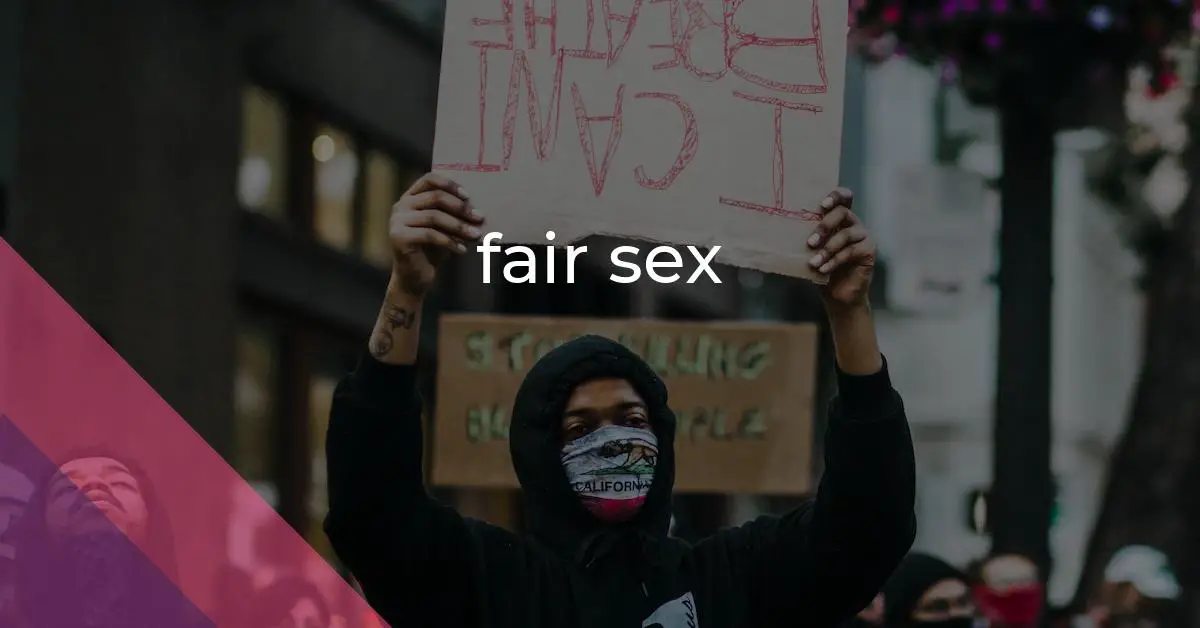fair sex: Idiom Meaning and Origin
What does ‘fair sex’ mean?
The idiom "fair sex" refers to women or the female gender. It suggests an admiration for women or the perception that they are delicate and charming.

Idiom Explorer
The idiom "lady garden" is a colloquial phrase that is used as a euphemism for the female genitalia or the vulva. It is considered a slang term and is often used in a humorous or light-hearted manner.
"Ladies' man" refers to a man who is popular or successful with women. He is often charming and knows how to attract and impress them. This idiom is commonly used to describe someone who is confident and skillful in romantic relationships with women.
The idiom "God's gift to women" is used to describe a man who believes he is incredibly attractive or desirable to women. It implies that he sees himself as a special or superior gift from God to women.
The idiom "gentle sex" refers to women or the female gender. It implies that women are delicate, refined, and in need of care and protection.
The idiom "fine feathers make fine birds" means that a person's appearance or external qualities can deceive others into thinking they possess admirable qualities or skills. However, this may not always be the case, as true value lies within a person rather than their outward appearance.
The idiom "fair to middling" means average or mediocre, neither good nor bad.
The idiom "fair share" means an equal or appropriate portion of something, often used in the context of dividing resources or responsibilities. It implies fairness and just distribution.
Decoding Gender Mysteries
The idiom "fair sex" is commonly used to refer to women or the female gender. This phrase has a long history that dates back to at least the 16th century. While its exact origin is uncertain, the meaning and usage of this idiom have evolved over time.
The word "fair" in this idiom often connotes beauty, attractiveness, or desirability. It comes from the Old English word "fæger," which originally meant "bright, clear, or good-looking." In this context, fairness reflects the societal norms and ideals of femininity that emphasized physical appearance and perceived beauty.
In early English literature, "fair" was frequently used to describe women, highlighting their beauty, grace, and virtue. This usage contributed to the development of the idiom "fair sex" as a way to categorize and differentiate women from men. The phrase gained popularity in the 18th and 19th centuries during the Romantic era, when women were idealized as delicate, pure, and lovable beings.
It's essential to recognize that the idiom "fair sex" is now considered outdated and somewhat derogatory by many. It reduces women to mere objects of beauty and implies an inherent inequality between genders. The use of gendered language can reinforce stereotypes and perpetuate gender discrimination, so it's crucial to exercise caution when using this expression in modern contexts.
Despite its outdated nature, the idiom "fair sex" holds historical significance and has influenced language and culture. It reminds us of the changing dynamics and societal attitudes towards gender throughout history. As we strive for gender equality and inclusivity, it's essential to critically analyze and question the language we use to describe and define one another.
Language constantly evolves, and the idiom "fair sex" remains a relic of the past. It prompts contemplation on the complexities of gender, beauty standards, and societal expectations. This idiom serves as a testament to the enduring power of idiomatic expressions in reflecting and shaping the social fabric of our lives. It leaves us intrigued and curious about the etymology and cultural nuances that govern our everyday language.
The first related idiom, "gentle sex," is another term used to refer to women. It carries a similar connotation to the idiom "fair sex," highlighting women's gentleness and perceived delicacy. While it may have been used in the past to praise women's supposed traits, it is important to recognize that these stereotypes can be limiting and reinforce gender roles.
The second related idiom, "fair game," has a different meaning altogether. It refers to something or someone that is considered a legitimate target or opportunity, often in a competitive or challenging context. The phrase originates from hunting, where "fair game" referred to animals that could be hunted without restriction or penalty. In a broader sense, "fair game" implies that someone or something can be pursued, targeted, or criticized within the bounds of fairness and ethical limits.
The third related idiom, "fair-haired boy," is an expression used to describe someone who is favored or given preferential treatment. It typically refers to a person, often young and male, who is especially liked, trusted, or promoted by someone in a position of power or authority. The phrase originates from the symbolism associated with fair or blonde hair, which has historically been considered desirable and associated with innocence or youth.
Overall, these idioms provide additional perspectives on the cultural and linguistic implications of the idiom "fair sex." Their usage and meanings reflect different aspects of gender, power dynamics, and societal ideals. By exploring these idioms alongside the idiom "fair sex," we gain a deeper understanding of how language shapes our perceptions and reinforces social constructs.
Example usage
Examples of how the idiom *fair sex* can be used in a sentence:
- He always seemed to have a soft spot for the fair sex, often flirting with women at parties.
- The book is a fascinating exploration of the challenges faced by the fair sex throughout history.
- She was known for her wit and charm, which made her a favorite among the fair sex.
More "Gender" idioms



